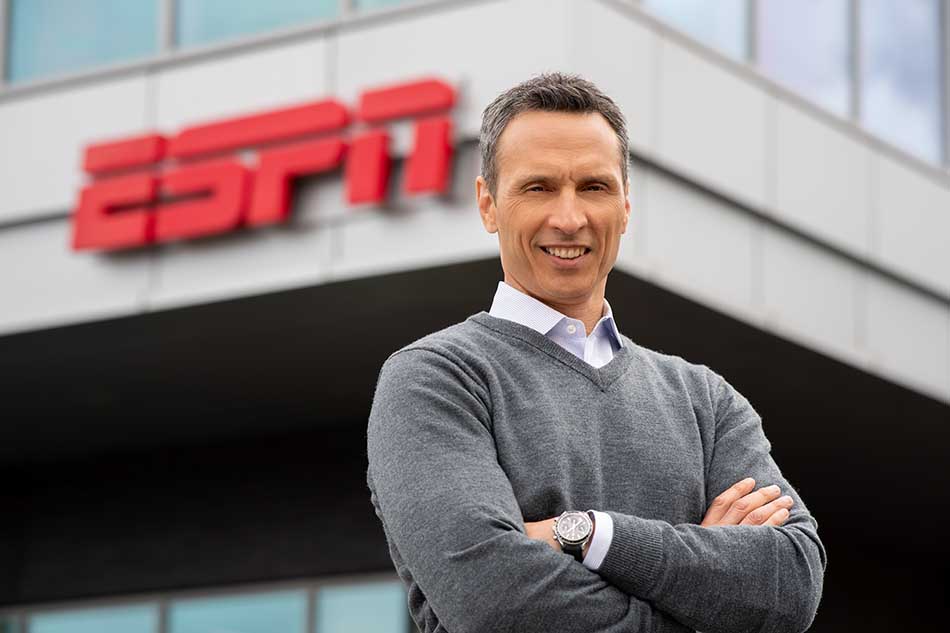
Disney is actively making plans to take the live sports programming from ESPN's flagship pay TV channel and launch it into a direct-to-consumer streaming service, according to a Thursday report in the Wall Street Journal.
The initiative even has a project codename, according to the paper: "Flagship."
According to the report, the ESPN channel would still exist in the U.S. pay TV ecosystem, within which it remains without dispute the most powerful remaining customer draw.
But the network is in the process of working language into its distribution contracts -- both with the leagues it licenses rights from and the pay TV operators that run its channels -- so that it can go DTC, was well. No timeline was included in any of this.
Disney has yet to officially comment. But we already knew Disney and ESPN were thinking about this.
Two weeks ago, ESPN Chairman Jimmy Pitaro told Bloomberg, “We’re going to get to a point where we take our entire network, our flagship programming, and make it available direct to consumer. That’s a ‘when,’ not an ‘if.' ... We’re only going to do it when it makes sense for our business and for our bottom line.”
Pitaro's comments came after Disney CEO Bob Iger told investors in February that ESPN would go DTC "one day."
Cord-cutting data that's emerged over the past two weeks just might have accelerated Disney/ESPN's thinking. Late last week, equity research company MoffettNathanson published a damning report suggesting not only that cord-cutting had reached record levels at 2.3 million lost customers in Q1, it had lapsed into a terminal "doom cycle" that will only continue to deliver accelerated subscriber losses.
U.S. pay TV subscribers are now at a level not seen since the early 1990s, the report noted.
According to documents filed with the SEC last year, Disney lost more than 2 million ESPN subscribers in the last fiscal year alone.
As its subscriber base dwindles due to cord-cutting, ESPN's sports content costs keep rising. For example, Disney already pays the NBA $1.4 million a year to show its regular season and playoff games on ABC and ESPN. And when that deal expires in 2025, Disney and ESPN are going to have to pay a lot more each year to renew it.
Disney currently makes a portion of ESPN programming, including "30 For 30"-branded documentaries, available on DTC streaming service ESPN Plus. But content like the daily sports news show SportsCenter, not to mention live sports itself, including Thursday night's NBA Western Conference Finals Game 2 showdown between the Los Angeles Lakers and Denver Nuggets, is only available on the live ESPN cable channel.
In addition to the particularly bad cord-cutting news, Disney and ESPN are undoubtedly noticing that other live sports are breaking away from traditional linear constraints.
For example, amid a challenging period overall for regional sports networks, the NBA's Phoenix Suns and NHL's Vegas Golden Knights both announced plans in recent weeks to exit their RSN arrangements and deliver their games via DTC streaming and local over-the-air broadcasting.
Meanwhile, NBCU paid the NFL a reported $110 million to stream a January AFC Wild Card game exclusively on Peacock.
All of this comes after Amazon delivered impressive young-demo performances in its first season as the exclusive holder of NFL Thursday Night Football TV rights, and YouTube won the bidding to take over NFL Sunday Ticket from DirecTV.
“Amazon took one football game and put it on Thursday night and changed the entire consumption of America with a game that only had 50% of the viewing it had on broadcast the year before, give or take based on the numbers I’ve seen,” Comcast CEO Brian Roberts said Monday during an appearance at a MoffettNathanson investor event.
“Sunday Ticket is about to go and become only available on streaming," Roberts added. "Bob Iger has been ruminating about ESPN going streaming, regional sports networks are going through some difficult times and talking about streaming. ... If I said who thinks we’re going to have more streaming in 10 years than we have today of sports, probably every hand goes up.”







